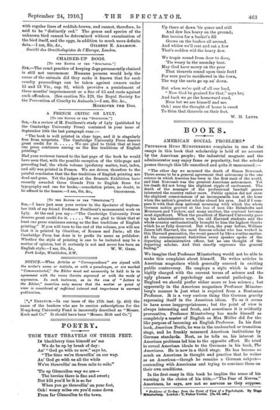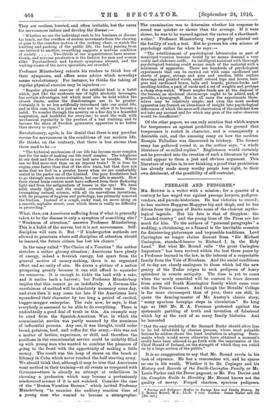BOOKS.
AMERICAN SOCIAL PROBLEMS.*
PROFESSOR HUGO MUNSTERBERG complains in one of the essays in this book that scholarship is held of no account
by the American people ; the industrial magnate and the administrator may enjoy fame or popularity, but the scholar passes through this life unnoticed and quits it =mourned :—
" The other day we mourned the death of Simon Newcomb. There seems to be a general agreement that astronomy is the one science in which America has been in the first rank of the world, and that Newcomb was the greatest American astronomer. Yet his death did not bring the slightest ripple of excitement. The death of the manager of the professional baseball games interested the country rather more. Public opinion did not show the slightest consciousness of an incomparable loss at the hour when the nation's greatest scholar closed his eyes. And if I com- pare it with that deep national mourning with which the whole German nation grieved at the loss of men like Helmholtz and Mommsen and Virchow, and many another, the contrast becomes most significant. When the president of Harvard University gave np his administrative work, the old Harvard students and the whole country enthusiastically brought to him the highest thanks which he so fully deserved. But when, the year before, William James left Harvard, the moat famous scholar who has worked in this Harvard generation, the event passed by liko a routine matter. At the commencement festivities every speaker spoke of the departing administrative officer, but no one thought of the departing scholar. And that exactly expresses the general feeling"
We imagine that Professor Milnsterberg would not be able to make this complaint about himself. He writes articles in
American magazines which generally succeed in exciting public controversy. He employs a style which is rather highly charged with the current terms of science and the ugly phrases of psychology and mental pathology. In England we should prefer either more or less science ; but apparently in the American magazines Professor Munster- berg's manner 'is just what is required from a Bostonian Professor. It is a very curious thing this German gravity expressing itself in the American idiom. To us it seems to have some inappropriateness ; but the point of view is always interesting and fresh, and sometimes it is evidently provocative, Professor Munsterberg has made himself as completely & master of English as Max Muller did for the like purpose of becoming an English Professor. In his first book, American Traits, he was in the unabsorbed or transition
stage, and he frankly measured American institutions by
German standards. Next, as he tells us, his interest in American problems led him to the opposite effort. He tried to reveal American ideals to the Germans in his book, The Americans. He is now in a third stage. He has become so much an American in thought and practice that he writes
as an American—though he remains a German subject— contending with Americans and trying to convince them on their own conditions.
In the first essay in this book he implies the sense of his warning in the choice of his title,--" The Fear of Nerves." Americans, he says, are not so nervous as they 'suppose.
• Problems of Today: Tamer Fwo.fre odfPy By m IOmstrberg. Londona ap
They are restless, hurried, and often irritable, but the cures for nervousness induce and develop the disease :—
" Whether we see the individual rush to his business or devour his lunch, see the overflow of useless movements from the chewing of gum to the ceaseless motion of the rocking chair, or watch the hustling and pushing of the public life, the hasty passing from one interest to another, everything suggests a nervous condition of society Two-thirds of our acquaintances have neuras- thenia, and nervous prostration is the fashion for men and women alike. Psychasthenic and hysteric symptoms abound, and the waiting-rooms of the nerve specialists are crowded."
Professor Miiiasterberg exhorts his readers to think less of their symptoms, and offers some advice which nowadays seems revolutionary. For instance, he thinks the taking of regular physical exercise may be injurious :—
" Regular physical exercise of the artificial kind is a habit which, just like the moderate use of light alcoholic beverages, has certain advantages, but which must also be held within the closest limits, unless the disadvantages are to be greater. Certainly it is no less artificially introduced into our social life, and in this case, too, it is just as wise not to allow it to become a habit. To wander through the country on a fine day is a beautiful inspiration, and healthful for everyone ; to need the walk with mechanical regularity is the product of a bad training, and to become the slave of Swedish gymnastic apparatus is no better than slavery to cigars."
Revolutionary, again, is his denial that there is any peculiar excuse for nervousness in the conditions of our modern life. He thinks, on the contrary, that there is less excuse than there used to be :—
" The technical mechanism of our life has become more complex just for the sake of making our life itself simpler. The telephone • at our desk and the elevator in our ball save us trouble. Where can we find more rest than on an express train ? It is true its engine runs faster than that of the slow train, but that does not mean that we feel in a greater hurry when we are comfortably seated in the parlor car of the Limited. Our poor forefathers had to go through much nerve-irritation, but our life is smooth. How their .visual brain centers must have suffered from their flickering light and from the astigmatism of lenses in the eye We have mild, steady light, and the oculist corrects our lenses. Our triumphing natural science, with all its marvellous inventions, with its progress of hygiene and pathology, has primarily removed the friction. Instead of a rough, rocky road, we move along on a smooth, asphalts street, over which there is really no difficulty in proceeding."
What, then, are Americans suffering from if what is generally taken to be the disease is only a symptom of something else? " Weakness of attention," answers Professor Miinsterberg. This is a habit of the nerves, but it is not nervousness. Self- discipline will cure it. But " if kindergarten methods are allowed to penetrate where self-discipline of attention should be learned, the future citizen has lost his chance."
In the essay called " The Choice of a Vocation " the author sketches a rather gloomy situation ; Americans have plenty of energy, indeed a feverish energy, but apart from the general motive of money-making, there is no organised effort and no unity of aim. He draws a picture of a nation prospering greatly because it can still afford to squander its resources. It is enough to tickle the land with a rake,
and it smiles back a harvest ; but Professor Munsterberg
implies that this cannot go on indefinitely. A German-like carefulness of method will be absolutely necessary some day, and even then it may come too late if the Americans have squandered their character by too long a period of excited, bugger-mugger enterprise. The rule now, he says, is that everybody is assumed to be able to do everything. There is undoubtedly a good deal of truth in this. An example may be cited from the Spanish-American War, in which the commissariat service was partly manned by the nominees of influential persons. Any one, it was thought, could order bread, potatoes, beef, and coffee for the army,—this was not a matter of tactics, experience, or drill, and therefore the positions in the commissariat service could be suitably filled up with young men who wanted to combine the pleasure of going to the front with the opportunity of making a little money. The result was the heap of stores on the beach at Siboney in Cuba which never reached the half-starving army. We should think that, although it may be true that Americans want method in their training—at all events as compared with Germans—there is already an attempt at orderliness in choosing a profession which may become a portentously misdirected science if it is not watched. Consider the case of the " Boston Vocation Bureau," which invited Professor
Munsterberg "to examine the auditory reaction time of a young man who wanted to become a stenographer.
The examination was to determine whether his response to sound was quicker or slower than the average. If it were slower, he was to be warned against the career of a shorthand- writer." Professor Miinsterberg very properly pointed out the futility of such a teat. But he presses his own science of psychology rather far when he says :—
" The establishment of psychological laboratories as part of municipal vocation bureaus would by no means demand a very costly and elaborate outfit. An intelligent assistant with thorough psychological training could secure much of the material with a minimum of apparatus. There are hundreds of psychological experiments that can be carried out with some cardboard and sheets of paper, strings and pins and needles, little outline drawings and printed words, small colored tops and levers, hair- pins and cardboard boxes, balls and boards, picture-books and smelling-bottles, a pack of cards and a set of weights and perhaps a cheap stop-watch. Where ampler funds are at the disposal of the bureau, an electrical chronoscope ought to be added, and, if possible, a kymograph. But in all cases the experiments them- selves may be relatively simple, and even the most modest apparatus can furnish an abundance of insight into psychological differences of which the mere self-observation of the candidate does not take any account and for which any gaze of the outer observer would be insufficient."
Of the other papers, we can only mention that which argues for temperance as against prohibition on the ground that temperance is rooted in character, and is consequently a desirable cult, and the amusing essay on how the medium Eusapia Palladino was discovered in trickery. The former essay has gathered round it, as the • author says, " a whole literature of so-called replies." Englishmen would certainly not be provoked into the creation of such a literature by what would appear to them a just and obvious argument. This literature of replies is, to our thinking, a proof that prohibition has already made many worthy people lose sight, to their own detriment, of the possibility of self-restraint.











































 Previous page
Previous page